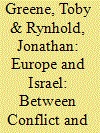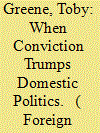| Srl | Item |
| 1 |
ID:
160913


|
|
|
|
|
| Summary/Abstract |
Frustration over right-wing Israeli policies on Palestine has held back the advance of EU–Israel relations, but has not yet led to EU-wide pressure.
|
|
|
|
|
|
|
|
|
|
|
|
|
|
|
|
| 2 |
ID:
141281


|
|
|
|
|
| Summary/Abstract |
The Israeli-Palestinian conflict is of enormous interest to scholars and policy-makers, yet the internal Israeli policy debate on this issue is often overlooked or oversimplified. It is impossible to understand Israeli actions, the constraints on Israeli decision-makers and the trajectory of the conflict itself without a deeper understanding of this debate. This article presents a framework for categorizing the leading policy prescriptions currently advocated in Israel with respect to the Israeli-Palestinian conflict, drawing on public statements by politicians and leading think-tanks, and surveys of public opinion. The most discussed Israeli policy options are presented as follows: maintain the status quo; proactively move towards two states through either a negotiated agreement (Plan A) or unilateral separation (Plan B); or entrench Israeli presence in the West Bank through settlement expansion and annexation. Various public opinion surveys show the extent to which the Israeli public is divided on the issues, and an analysis of Israel's 2013–14 coalition demonstrates how all these approaches were being promoted simultaneously within the same cabinet, contributing to policy incoherence. The article concludes by outlining how Palestinian and international actions are influencing the Israeli debate, and argues that a move away from the status quo will require decisive Israeli leadership. It also suggests that third party attempts to impose terms for resolving the conflict that do not respond to concerns held widely in Israel are likely to fuel the argument of the status quo camp in the Israeli debate.
|
|
|
|
|
|
|
|
|
|
|
|
|
|
|
|
| 3 |
ID:
164665


|
|
|
|
|
| Summary/Abstract |
It has been argued that domestic political survival is key to political decision making, including in foreign policy. Poliheuristic decision theory claims that “Politicians will not shoot themselves in the foot by selecting alternatives that are likely to have a negative effect on them politically.” How then does one explain a foreign policy decision which causes grievous harm to the political position of the decision maker? The paper reviews existing research on personality and environmental factors which may reduce the significance of domestic political constraints on foreign policy decisions. It then examines Blair's response to the 2006 Israel-Hezbollah conflict, in which his support for Israel triggered a backbench revolt forcing him to announce he would step down within 12 months. The account demonstrates that Blair was aware of the potential political costs of his position, but stuck to it regardless. By seeking to explain why this case diverges from theoretical expectations, the paper generates new hypotheses about how personality and environmental factors may lead to leadership convictions, and not domestic political survival, being the ‘essence of decision’.
|
|
|
|
|
|
|
|
|
|
|
|
|
|
|
|